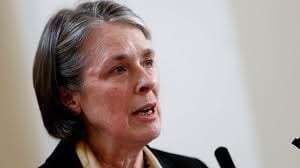by Andrew Carey
IRELAND has the lowest number of judges among the 47 countries affiliated to the Council of Europe, Chief Justice Susan Denham told a gathering of lawyers and court officials in Limerick last week.
Speaking at the opening of the combined court office for Limerick, Ms Justice Denham said that this Friday’s referendum on the establishment a new Court of Appeal was an invitation for citizens to re-imagine the constitutional framework of the courts system.
While not advising how people should vote in the referendum, she said that it was incumbent on her as Chief Justice to set out the context in which the courts operate.
She said that the Court of Criminal Appeal was seven times as busy as it was in 1937 while the Supreme Court was three times as busy as similar courts in the USA, Canada and the UK. There are currently 152 judges in Ireland – approximately three judges to every 100,000 of the population – while the average is 21 judges per 100,000 across other countries in the European council area.
In 2012 there was a 21 per cent increase in the number of appeals filed in the Supreme Court. 605 new cases were filed. Already, this year there have been over 400 cases appealed to the Supreme Court.
The Chief Justice said that despite the increase, the Court was getting through more cases than ever. In 2011, the Court disposed of 190 appeals with orders and written judgments. In 2012 this increased to 258”.
Ireland has 36 High Court judges meaning “we have 36 High Courts and one Supreme Court. Thus a bottleneck has developed” she said.
“This is an indefensible and unsustainable situation. Times have changed radically since 1937. Behind all of the statistics there are human stories of people with real legal difficulties waiting to be resolved”.
The 2012 Courts Service annual report highlighted that all other common law countries have a Court of Appeal while Ireland has no civil court of appeal or full time court of appeal.
Justice Denham said the courts were operating with 26 per cent less expenditure over the past five years, and that this along with other changes meant that the net cost of the courts to the Exchequer was reduced by 41 per cent.



